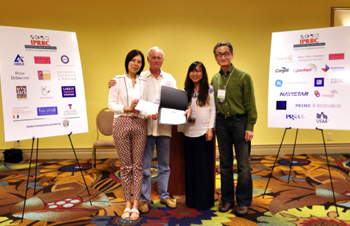Accomplishments
Communication scholar wins Best Paper on International Strategic Communication awarded by International Public Relations Research Conference
Dr Regina Chen, Assistant Professor of Communication Studies of the School of Communication, won the Koichi Yamamura International Strategic Communication Award at the 18th International Public Relations Research Conference (IPRRC) for her co-authored paper with Dr Flora Hung-Baesecke and Dr Kim Jeong-nam.
Entitled “Social Amplification of Problem Chain-Recognition Effect on Risk Policies:
Escalated Issue Spillover from Government Distrust and Media Use”, the study utilised situational theory of problem solving (STOPS) to test the problem chain-recognition effect on policies involving highly publicised risk controversies in Taiwan and two affecting factors (government distrust and media use) of the effect.
Problem chain-recognition effect refers to the perceptual tendency that people are likely to recognise similar or related issues to an identified problem as problematic because (1) problems are often connected together and/or embedded within a larger network of problems and (2) people often utilise stereotyping in information processing, especially when they have limited knowledge about or low interest in the issues. This effect is easily triggered when an individual actively seeks, exchanges, and discusses information about a perceived problem.
Online-survey data of 748 Taiwanese citizens aged between18 and 76 suggested the existence of the problem chain-recognition effect in two controversial policies with intensive media coverage: the problem chain-recognition effect of the US beef import policy on the fourth nuclear power plant policy. Taiwanese participants who disagreed with the government’s decision to resume US beef imports tended to perceive the nuclear power plant policy as problematic. In addition, the participants’ distrust of government enhanced the found effect but did not significantly alter their use of traditional and digital media for news and information gathering.
The results provide three major implications for risk management research and practice. First, the situational theory (or STOPS) can be an effective tool for identifying the problem chain-recognition effect. Secondly, the problem chain-recognition effect can exist in highly publicised controversial issues concerning different kinds of risks (for example, concerns over food-safety could transfer to issues related to the safe use of technology). And lastly, low trust in government served as a contextual factor that strengthens such effect. This paper further cements the idea that cultivating public trust should be the top priority of the government in order to manage public sentiment over controversial policies.
The award was presented at the 18th IPRRC held on 7 March in Miami, USA. IPRRC is one of the top academic public relations research venues. This year, 108 papers were accepted for presentation at the conference.
 |
|
 |
Dr Regina Chen (left) and Dr Flora Hung-Baesecke (second from right) receive the award from Professor Don Stacks, IPRRC Executive Director (second from left) and Dr Koichi Yamamura, Award Sponsor (right) |


